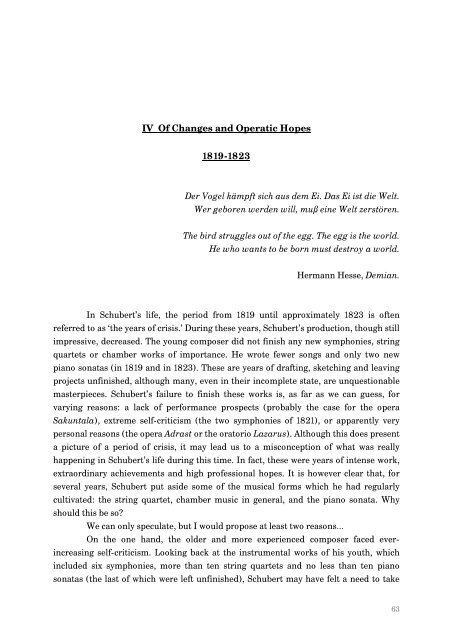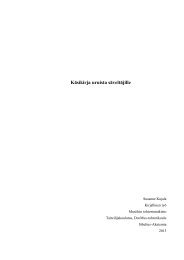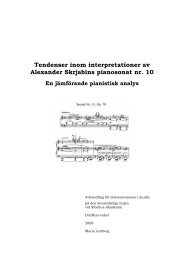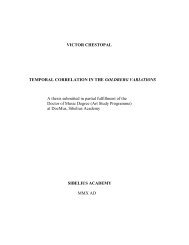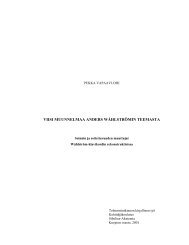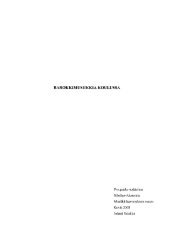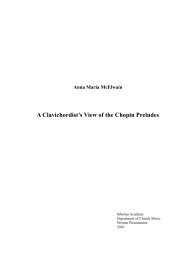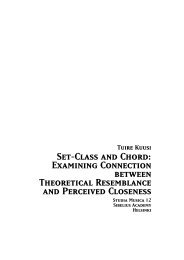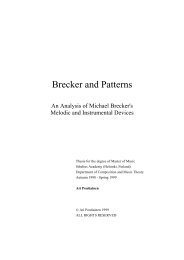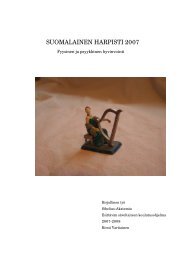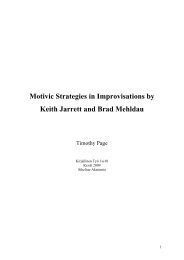The Unfinished Piano Sonatas of Franz Schubert Javier ... - Ethesis
The Unfinished Piano Sonatas of Franz Schubert Javier ... - Ethesis
The Unfinished Piano Sonatas of Franz Schubert Javier ... - Ethesis
You also want an ePaper? Increase the reach of your titles
YUMPU automatically turns print PDFs into web optimized ePapers that Google loves.
IV Of Changes and Operatic Hopes<br />
1819-1823<br />
Der Vogel kämpft sich aus dem Ei. Das Ei ist die Welt.<br />
Wer geboren werden will, muß eine Welt zerstören.<br />
<strong>The</strong> bird struggles out <strong>of</strong> the egg. <strong>The</strong> egg is the world.<br />
He who wants to be born must destroy a world.<br />
Hermann Hesse, Demian.<br />
In <strong>Schubert</strong>’s life, the period from 1819 until approximately 1823 is <strong>of</strong>ten<br />
referred to as ‘the years <strong>of</strong> crisis.’ During these years, <strong>Schubert</strong>’s production, though still<br />
impressive, decreased. <strong>The</strong> young composer did not finish any new symphonies, string<br />
quartets or chamber works <strong>of</strong> importance. He wrote fewer songs and only two new<br />
piano sonatas (in 1819 and in 1823). <strong>The</strong>se are years <strong>of</strong> drafting, sketching and leaving<br />
projects unfinished, although many, even in their incomplete state, are unquestionable<br />
masterpieces. <strong>Schubert</strong>’s failure to finish these works is, as far as we can guess, for<br />
varying reasons: a lack <strong>of</strong> performance prospects (probably the case for the opera<br />
Sakuntala), extreme self-criticism (the two symphonies <strong>of</strong> 1821), or apparently very<br />
personal reasons (the opera Adrast or the oratorio Lazarus). Although this does present<br />
a picture <strong>of</strong> a period <strong>of</strong> crisis, it may lead us to a misconception <strong>of</strong> what was really<br />
happening in <strong>Schubert</strong>’s life during this time. In fact, these were years <strong>of</strong> intense work,<br />
extraordinary achievements and high pr<strong>of</strong>essional hopes. It is however clear that, for<br />
several years, <strong>Schubert</strong> put aside some <strong>of</strong> the musical forms which he had regularly<br />
cultivated: the string quartet, chamber music in general, and the piano sonata. Why<br />
should this be so?<br />
We can only speculate, but I would propose at least two reasons…<br />
On the one hand, the older and more experienced composer faced everincreasing<br />
self-criticism. Looking back at the instrumental works <strong>of</strong> his youth, which<br />
included six symphonies, more than ten string quartets and no less than ten piano<br />
sonatas (the last <strong>of</strong> which were left unfinished), <strong>Schubert</strong> may have felt a need to take<br />
63


